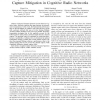Free Online Productivity Tools
i2Speak
i2Symbol
i2OCR
iTex2Img
iWeb2Print
iWeb2Shot
i2Type
iPdf2Split
iPdf2Merge
i2Bopomofo
i2Arabic
i2Style
i2Image
i2PDF
iLatex2Rtf
Sci2ools
117
click to vote
ICASSP
2011
IEEE
2011
IEEE
Optimal transmission strategies for channel capture mitigation in Cognitive Radio Networks
Abstract—Temporal Dynamic Spectrum Access (DSA) in Cognitive Radio Networks exploits time gaps between the primary users transmissions. In this work, the fundamental performance limit on the throughput of cognitive radio networks that coexist with a primary network that uses a Carrier Sensing Multiple Accesses (CSMA) medium access protocol is studied. Secondary transmission strategies that do not explicitly account for the CSMA protocol of the primary network usually lead to a channel capture. The problem cannot be addressed by monitoring interference or probability of collision. Here we formulate the optimal transmission strategy problem that avoids channel capture. We show the proposed strategy achieves a performance close to the optimal strategy that do not account for channel capture, while completely eliminates channel capture effect.
Related Content
| Added | 20 Aug 2011 |
| Updated | 20 Aug 2011 |
| Type | Journal |
| Year | 2011 |
| Where | ICASSP |
| Authors | Yingxi Liu, Nikhil Kundargi, Ahmed H. Tewfik |
Comments (0)

